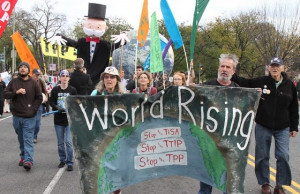The High Price Of Desertification: 23 Hectares Of Land A Minute
By Busani Bafana for IPS - BULAWAYO, Zimbabwe, Jun 15 2017 (IPS) - Urban farmer Margaret Gauti Mpofu would do anything to protect the productivity of her land. Healthy soil means she is assured of harvest and enough food and income to look after her family. Each morning, Mpofu, 54, treks to her 5,000-square-metre plot in Hyde Park, about 20 km west of the city of Bulawayo. With a 20-litre plastic bucket filled with cow manure in hand, Mpofu expertly scoops the compost and sprinkles a handful besides thriving leaf vegetables and onions planted in rows across the length of the field, which is irrigated with treated waste water. Mpofu’s act of feeding the land is minuscule in fighting the big problem of land degradation. But replicated by many farmers on a large scale, it can restore the productivity of arable land. “I should not be doing this,” Mpofu tells IPS pointing to furrows on her field left by floodwater running down the slope during irrigation. “The soil is losing fertility each time we irrigate because the water flows fast, taking valuable topsoil with it. I have to constantly add manure to improve fertility in the soil and this also improves my yields.”


